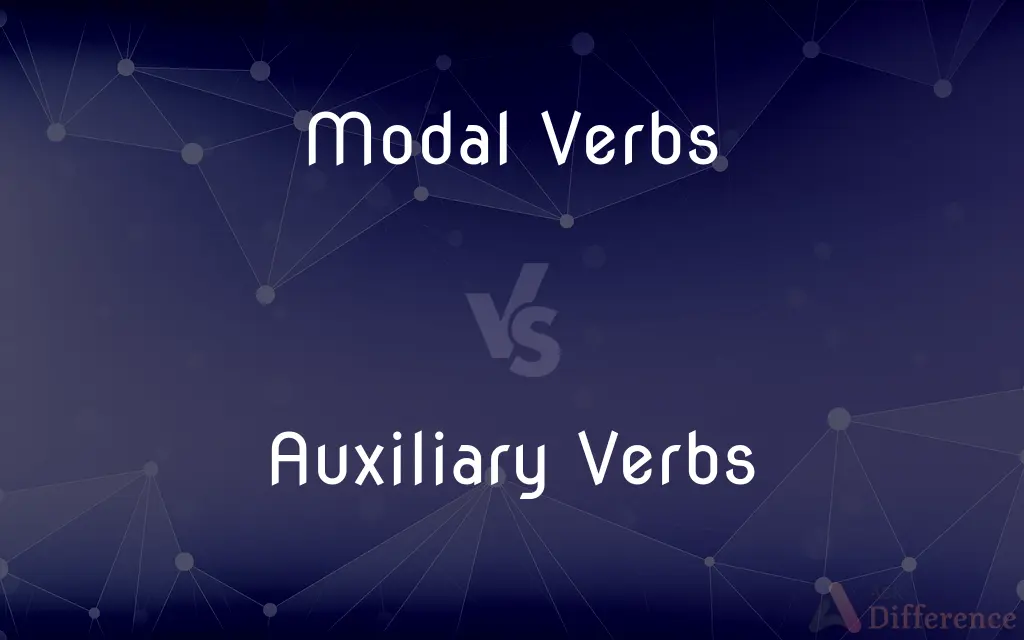Modal Verbs vs. Auxiliary Verbs — What's the Difference?
Edited by Tayyaba Rehman — By Fiza Rafique — Published on December 21, 2023
Modal Verbs express necessity, possibility, or ability, e.g., "can," "must." Auxiliary Verbs, including modals, support main verbs to form tenses, voice, or mood, e.g., "be," "have."

Difference Between Modal Verbs and Auxiliary Verbs
Table of Contents
ADVERTISEMENT
Key Differences
In the realm of English grammar, both Modal Verbs and Auxiliary Verbs play crucial roles in shaping the nuances of sentences. Modal Verbs are a subset of auxiliary verbs that specifically indicate modality. This means they help convey necessity, possibility, permission, or ability. Common Modal Verbs include "can," "will," "should," "must," and "might." For instance, in the sentence "She can swim," the modal verb "can" indicates ability.
On the other hand, Auxiliary Verbs, often termed as "helping verbs," are used alongside main verbs to give more detail about the verb's tense, voice, or mood. While Modal Verbs are a subset of Auxiliary Verbs, not all auxiliary verbs convey modality. The most common Auxiliary Verbs include "be," "have," and "do." In the sentence "She is swimming," "is" serves as the auxiliary verb, helping to form the present continuous tense.
Delving deeper into Modal Verbs, they never change form or tense, meaning they don't take "-s," "-ed," or "-ing" endings. This sets Modal Verbs apart from other verbs. For example, while we say "She can swim," we never say "She cans swim."
In contrast, Auxiliary Verbs can change form depending on the tense of the sentence. For instance, "She has swum" uses "has" (an auxiliary verb) in the present perfect tense. The dynamism of Auxiliary Verbs contrasts with the static nature of Modal Verbs.
In summary, while all Modal Verbs are Auxiliary Verbs, not all Auxiliary Verbs are modals. The primary distinction lies in their function: Modal Verbs denote modality, while Auxiliary Verbs support main verbs in conveying tense, voice, or mood.
ADVERTISEMENT
Comparison Chart
Function
Indicate modality
Support main verbs (tense, voice, mood)
Examples
"can," "must," "should"
"be," "have," "do," "can," "must"
Form Variation
Don't change form or tense
Can change form depending on tense
Usage with Main Verb
Always accompany a main verb
Always accompany a main verb
Indication
Necessity, possibility, permission, ability
Tense, voice, or mood of the main verb
Compare with Definitions
Modal Verbs
Verbs that express ability or possibility.
She can speak French fluently.
Auxiliary Verbs
Verbs often used in questions, negations, or emphasis.
I do not want any dessert.
Modal Verbs
Verbs indicating obligation or necessity.
You must complete the assignment by tomorrow.
Auxiliary Verbs
Helping verbs that accompany main verbs.
They are playing soccer.
Modal Verbs
Verbs that convey a lack of necessity.
You needn't worry about the test.
Auxiliary Verbs
Verbs used to form tenses, moods, or voices of other verbs.
She has visited Paris several times.
Modal Verbs
Verbs suggesting probability or likelihood.
It might rain later.
Auxiliary Verbs
Verbs that modify main verbs to provide more detail.
Do you like chocolate?
Modal Verbs
Verbs used to request or offer permission.
May I borrow your pen?
Auxiliary Verbs
Verbs that can function both as main verbs and helping verbs.
She has a cat. (main) / She has gone to the store. (auxiliary)
Common Curiosities
Do Modal Verbs change form based on tense?
No, Modal Verbs remain consistent and don't take "-s," "-ed," or "-ing" endings.
Are all Modal Verbs also Auxiliary Verbs?
Yes, all Modal Verbs are a subset of Auxiliary Verbs.
Why are Modal Verbs important in English?
Modal Verbs help convey modality such as ability, necessity, or possibility.
How do Auxiliary Verbs help in sentence construction?
Auxiliary Verbs assist main verbs by indicating tense, voice, or mood.
Can the same word be both a Modal Verb and an Auxiliary Verb?
While all Modal Verbs are Auxiliary Verbs, not all Auxiliary Verbs are modals.
Can an Auxiliary Verb stand alone in a sentence?
No, Auxiliary Verbs typically accompany main verbs to provide additional information.
What's a common Modal Verb to express obligation?
"Must" is often used to express obligation.
Which Auxiliary Verb is commonly used with the past participle?
"Have" is frequently used with the past participle.
How does the meaning change with different Auxiliary Verbs?
The choice of Auxiliary Verb can alter tense, mood, or voice, thus changing the sentence's meaning.
How do you form a question using Auxiliary Verbs?
By placing the Auxiliary Verb before the subject, e.g., "Are you coming?"
Which Modal Verb indicates a strong possibility?
"Will" often indicates a strong possibility or future action.
Are phrases like "had better" considered Modal Verbs?
They are considered modal-like expressions, but not pure Modal Verbs.
Can Modal Verbs be used in all tenses?
No, Modal Verbs don't change form, limiting their use in various tenses.
Which verb, Modal or Auxiliary, is used to create the passive voice?
The Auxiliary Verb "be" is used alongside a past participle to create the passive voice.
What's a common mistake with Modal Verbs?
Using two Modal Verbs consecutively, like "She must can go," is incorrect.
Share Your Discovery

Previous Comparison
Tennis Shoes vs. Running Shoes
Next Comparison
Pascal Case vs. Camel CaseAuthor Spotlight
Written by
Fiza RafiqueFiza Rafique is a skilled content writer at AskDifference.com, where she meticulously refines and enhances written pieces. Drawing from her vast editorial expertise, Fiza ensures clarity, accuracy, and precision in every article. Passionate about language, she continually seeks to elevate the quality of content for readers worldwide.
Edited by
Tayyaba RehmanTayyaba Rehman is a distinguished writer, currently serving as a primary contributor to askdifference.com. As a researcher in semantics and etymology, Tayyaba's passion for the complexity of languages and their distinctions has found a perfect home on the platform. Tayyaba delves into the intricacies of language, distinguishing between commonly confused words and phrases, thereby providing clarity for readers worldwide.













































